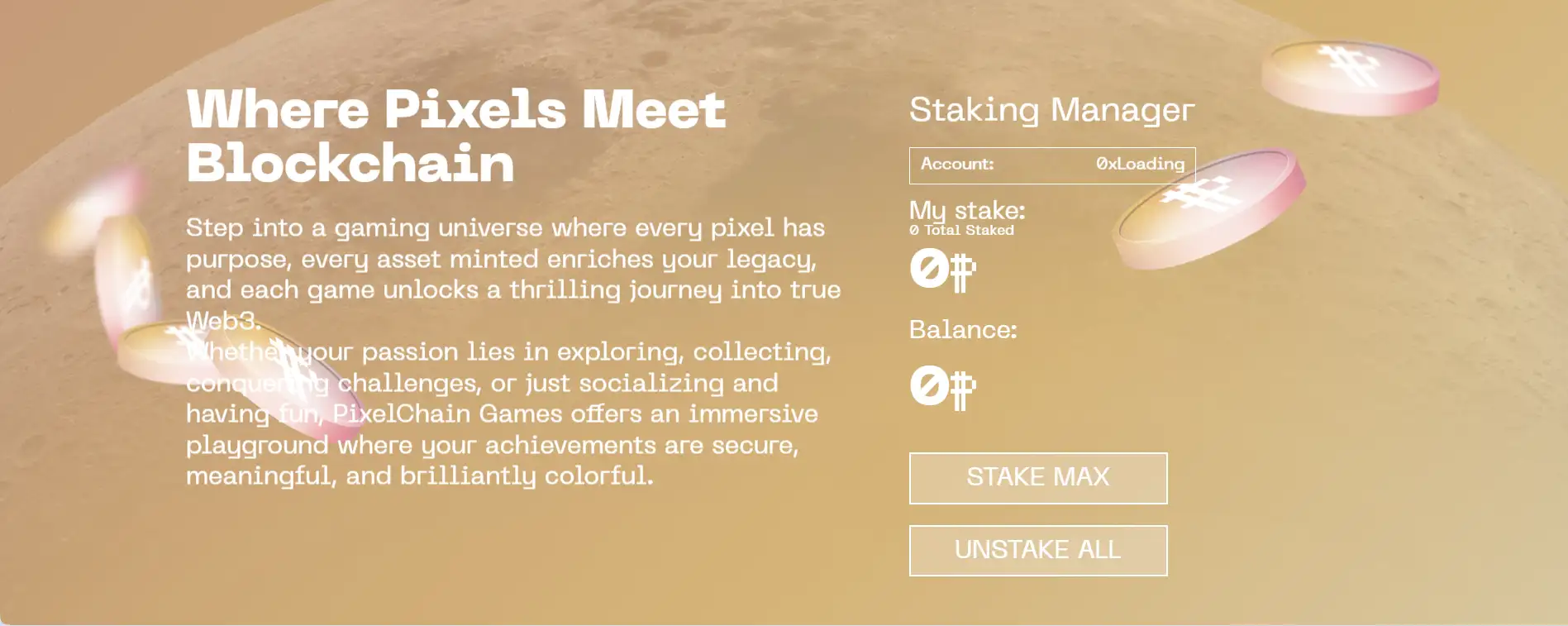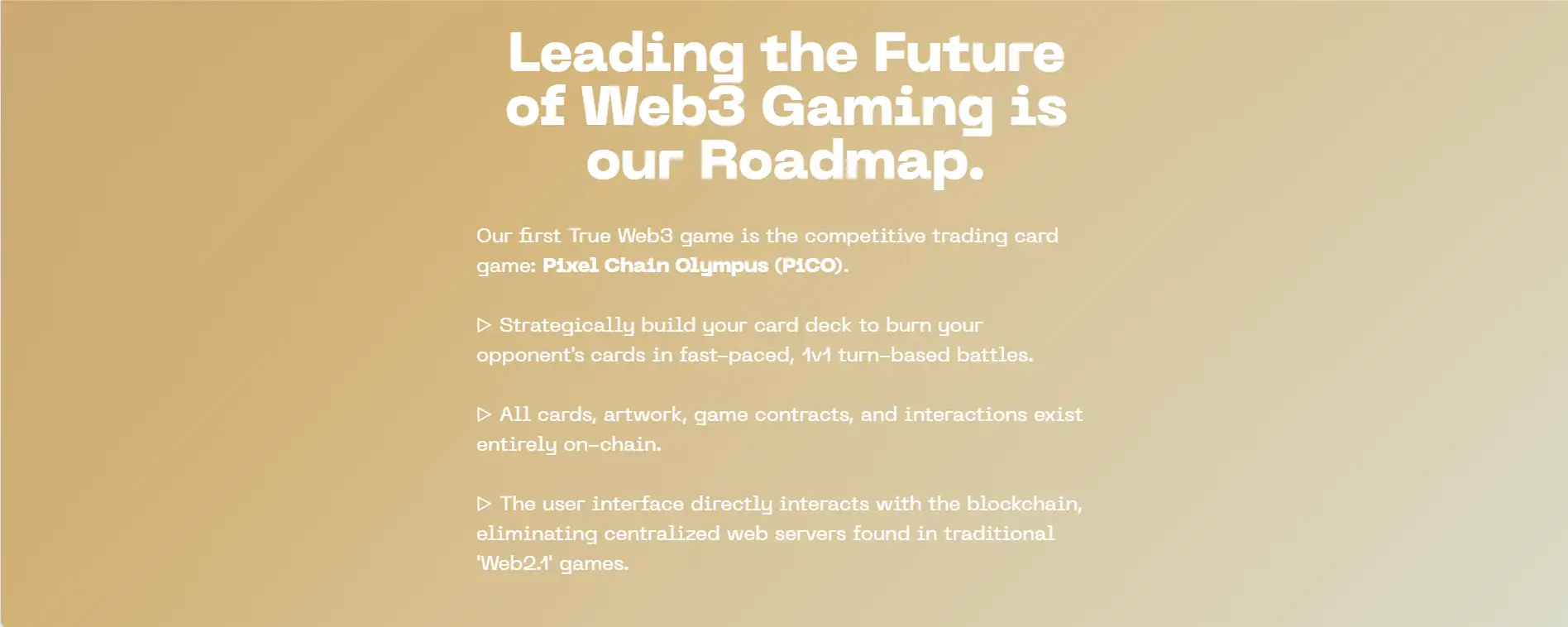About Pixel Chain Games
Pixel Chain Games is a fully decentralized Web3 gaming ecosystem that puts players in full control of their digital assets and in-game achievements. At its core, it blends on-chain mechanics with engaging gameplay, offering true ownership, provable scarcity, and an economic model that rewards skill, strategy, and participation. Pixel Chain Games goes beyond the hype of NFTs and GameFi—it delivers a gaming experience where players are also stakeholders.
Whether you're a strategist, collector, social gamer, or blockchain enthusiast, Pixel Chain Games provides a vibrant, pixel-art-inspired universe that values freedom, transparency, and community. Every in-game asset, from cards to interactions, lives on the blockchain. With no reliance on centralized servers, this platform redefines what it means to "own" your gaming experience in Web3.
Pixel Chain Games represents the new wave of fully on-chain gaming, where every player action, game logic, and item exists entirely on the blockchain. Built by a passionate team of Web3-native developers, the project aims to shift power away from centralized publishers and toward gamers themselves. Their flagship title, Pixel Chain Olympus (PiCO), exemplifies this philosophy—a competitive trading card game where you own, mint, burn, and stake cards entirely through on-chain interactions.
Unlike most "Web2.1" blockchain games that only integrate NFTs at the surface level while retaining centralized backends, Pixel Chain Games commits to true decentralization. All game mechanics, including card deck management, staking, and battle interactions, are conducted via smart contracts. The user interface acts merely as a visual layer interacting directly with the blockchain—there are no web2 servers in the loop.
The game's currency, PiCO Coin, serves as a native reward and staking token, enabling players to earn from battles and tournaments. Users can also mint new cards or burn opponent cards using token-based mechanics, adding real economic consequences to in-game decisions. This ecosystem ties gameplay and financial incentives in a way that's provable, permissionless, and aligned with Web3 principles.
Beyond PiCO, the Pixel Chain team envisions an entire suite of on-chain games under the same protocol. This includes open tournaments, governance mechanisms, staking dashboards, and collectible NFTs, all governed by code and not companies. Their staking portal is live, enabling players to stake PiCO for rewards, further integrating DeFi elements into the gaming experience.
In terms of competitors, Pixel Chain Games shares the on-chain game narrative with other titles like Curio (on-chain RPG with composable assets), and Skyweaver (a Web3 card battler with server-based logic). However, what sets Pixel Chain Games apart is its full commitment to keeping everything on-chain—including the game contracts, interactions, and card lifecycle—making it one of the truest examples of decentralized gaming.
With 33,000+ transactions already processed in its growing PiCO-verse, and a vibrant community active on Discord and Twitter, Pixel Chain Games is laying the groundwork for a future where play and ownership truly go hand in hand.
Pixel Chain Olympus (PiCO) is the first official title in the Pixel Chain Games ecosystem—a fast-paced, 1v1 on-chain trading card game where every move is recorded immutably on the blockchain.
- Deck Building: Players assemble decks using collectible cards, each minted as an NFT. Every card has specific attributes, powers, and visual art, all stored on-chain. This allows true verifiability and ownership of your gaming assets.
- Burn Mechanics: In each match, players can burn opponent cards during gameplay, reducing total supply and introducing a deflationary element to the card economy.
- Turn-Based Strategy: Battles are turn-based, requiring careful decision-making and sequencing. Timing your card plays can mean the difference between victory and defeat.
- Staking & Tournaments: Players can stake PiCO Coin to enter tournaments or simply to earn passive rewards. Tournament victories award $PiCO and leaderboard placement, providing real incentives for competitive play.
- On-Chain Interaction: All game functions—deck creation, gameplay moves, staking—are directly handled via smart contracts. There are no centralized APIs or hidden logic.
- Career Stats & Game Data: All your match wins, losses, minted cards, and PiCO earnings are transparently visible and verifiable on-chain.
- Zero Web2 Dependency: No centralized login, no email registration—just wallet connect, stake, play, and earn. It’s blockchain gaming in its purest form.
Getting started with Pixel Chain Games is simple and fully integrated with Web3 wallets. Here’s how to begin:
- Visit: Go to pixelchain.games and click on “Connect” in the top navigation.
- Connect Wallet: Use MetaMask or any Web3-compatible wallet to link your account. No email needed.
- Start Playing: Click “Play PiCO Now” to jump into a game. You can mint or use your existing cards to build your deck.
- Stake & Earn: Navigate to the Staking Manager section to stake your $PiCO tokens and begin earning passive rewards.
- Join the Community: Connect with other players on Discord or follow updates via X/Twitter.
- Read the Docs: For in-depth gameplay rules and tokenomics, refer to the official whitepaper linked on the homepage.
Pixel Chain Games FAQ
Pixel Chain Olympus (PiCO) is a rare example of a game where every element—from deck creation to gameplay logic—exists entirely on-chain. Unlike many games that use NFTs just for cosmetics, PiCO stores all cards, battles, and interactions in smart contracts. No web servers, no centralized logic—just pure blockchain gameplay.
Yes! In PiCO, card burning is a core mechanic. If your strategy succeeds in battle, you can permanently destroy an opponent’s card by triggering a burn function. This mechanic introduces a deflationary layer to the ecosystem and makes each battle high-stakes. It's not just for fun—it's for real ownership consequences.
Staking PiCO tokens gives you access to rewards, tournaments, and governance features within the Pixel Chain Games ecosystem. You can stake through the on-site Staking Manager by connecting your wallet. Rewards are distributed based on your contribution and staking duration.
All outcomes in PiCO are determined by smart contract logic and verifiable on-chain execution. There is no off-chain randomness or external game engine. This ensures every move, every burn, and every win is recorded and provable on the blockchain—transparency is absolute.
No downloads required. Just visit pixelchain.games, connect your Web3 wallet, and you’re ready to play. Everything runs in-browser and connects directly to the blockchain. No installations, no app stores—just pure Web3 access.
You Might Also Like












